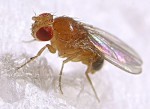Speaking of genetics, this is the week the results from our big triple point cross (it’s a kind of mapping cross where we determine the distances between three different genes) come rolling in. It’s always a bit nerve-wracking for me, because this is the first time these students have worked with flies, it involves a series of crosses with multiple points where they can screw up, and if they all messed up, we don’t have enough time in the semester to repeat it. So every week I go into the lab, and there are students who are staring confusedly at their bottles, and wondering if they did something wrong, and telling me they are are afraid they might have added males of the wrong phenotype, or they have confused which generation is which, or things are just addling their brain and they can no longer understand what they are doing.
And my job is to puzzle it all out, or figure out how we can test and make sure they’ve got the right flies, or to explain everything to ease their addlement. This is a simple experiment, but with a mob of novice Drosophila geneticists the natural condition is one of insurmountable obstacles on the road to imminent disaster. Every time. I feel a bit like Philip Henslow in this clip from Shakespeare in Love all semester long.
And he’s right! It does turn out well in the end, for mysterious reasons that always puzzle me. They’ve started turning in the numbers from the first few groups who are ready, and they’re pretty much what I expected, and there are no major anomalies, and everyone did every single one of the crosses correctly (major errors would lead to obviously and sharply different results, so I can tell). I think we can just trust the students to try hard to do everything right.
Now they just have to analyze the data and write up a formal lab report. Where is the report? Oh, it’s coming. It’s coming.



The Lord of the Flies has re-opened the Punnett squares!
(Which makes no sense because I have no sensible comment to make)
Either it all turned out well or (and I’m speaking from personal experience here) one or more students did a literature search, figured out how it was supposed to turn out and doctored their data accordingly.
No.
These are good students. You might be dishonest, but stop projecting.
The 3 point cross is an oldie but a goodie. There are other crosses that give interesting results too, and if you are ever looking for doing something different…
a) cross veinlet (which has a few trunkated wing veins) with vein (which has maybe one trunkated wing vein). The double mutants have wings that completely lack veins. Its a super-additive phenotype, and an example of gene interactions. This is one of many crosses done by Garcia Bellido many years ago. I have done this cross in a ‘former life’, its pretty cool.
b) and naturally one could try the crosses that cause extra bits of compound eyes to sprout out. Its the old Gal-4 / UAS system. I have never done this ,and am not sure how easy or hard it might be.
Then, of course, there are the creative errors — the ones that climb out of the flask, eat the building, lay Möbius strip shaped chocolate eggs, and disappear off into the sunset riding a Triceratops. They make for rather interesting lab reports.
PZ to chris61: “You might be dishonest, but stop projecting.”
My assumption had been that chris61’s “personal experience” was in the form of observing the dishonest behavior (as an instructor or fellow student), not in the form of committing it.
@7 leerudolph
Thank you.
#5: That would be tricky. This is an introductory course in undergraduate genetics, and I build everything gradually. Start with Mendel; then add chromosomal effects; then linkage and mapping, then toss in non-Mendelian allele interactions, extrachromosomal inheritance, etc. I end on developmental genetics and epistasis and epigenetics. So I’d love to add a lab experiment demonstrating gene interactions, except that the way the course is arranged they’d have to do it without any theory to explain the results, and then get it explained in the last two weeks of class.
Yes, but do your boots catch fire at the beginning of the semester?